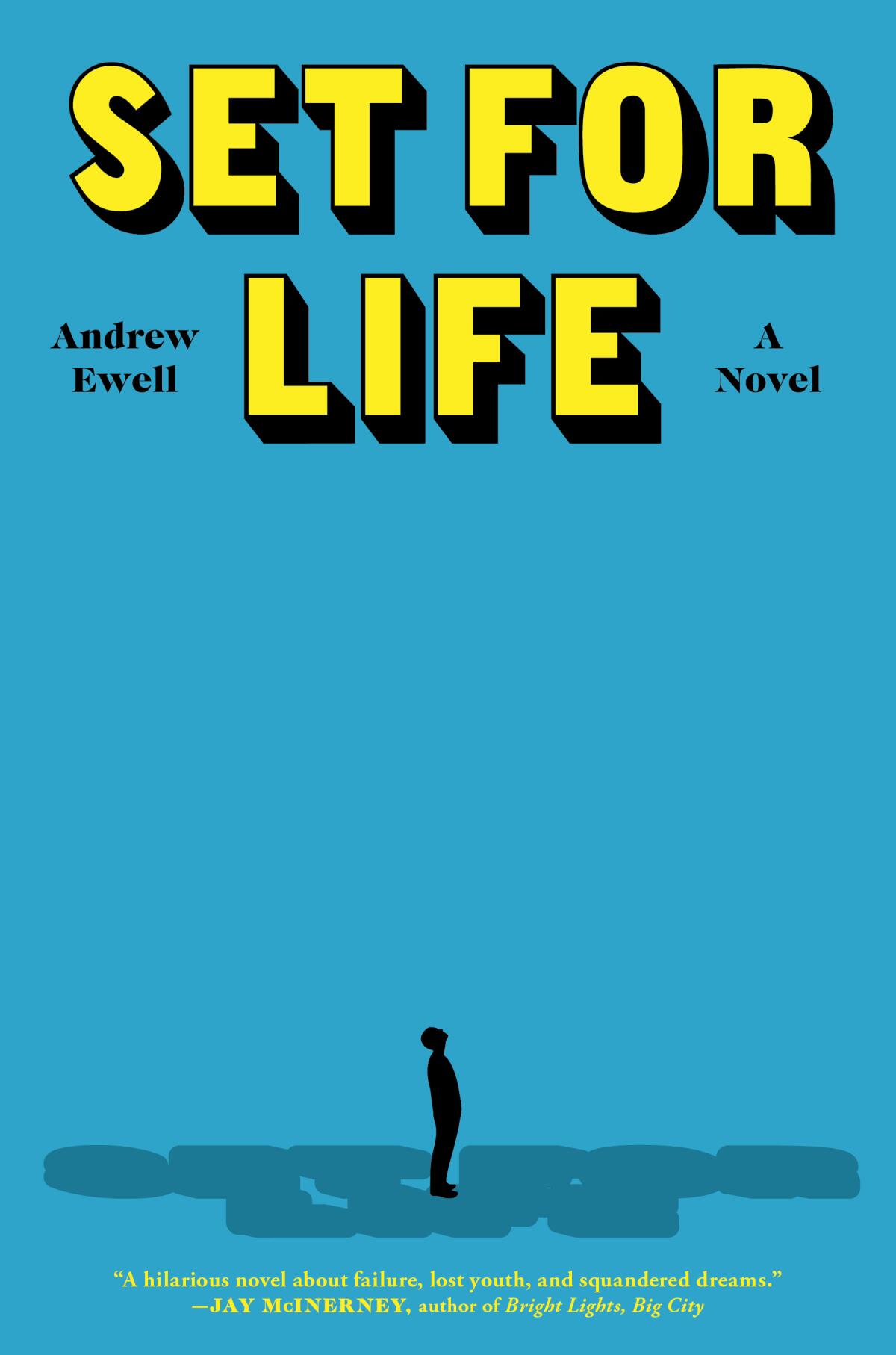It’s funny and cringey, but Andrew Ewell’s debut novel doesn’t live up to its potential

- Share via
Book Review
Set for Life
By Andrew Ewell
Simon & Schuster: 256 pages, $28
If you buy books linked on our site, The Times may earn a commission from Bookshop.org, whose fees support independent bookstores.
I’d been reading “Set for Life” for about half an hour when I realized it was approaching 11:30 p.m. I told myself I’d stop for the night in just a few pages. The next time I looked up from Andrew Ewell’s debut novel it was an hour later … and I still needed to find a good place to stop.
That’s the good news about the book — it’s well-crafted and often quite funny in a cringey way, easy to down in big gulps.
The downside is that at some point during the book you’re bound to wish Ewell had tackled a topic more ambitious and original. For most of the way, “Set for Life” is yet another novel about a loser middle-class white guy who is closed off from his emotions and blind to his flaws, who drinks too much while constantly sabotaging himself before hitting bottom and gaining some clarity. Much of the book is set in an academic environment and the rest takes place in Brooklyn, neither of which are exactly unplowed territory. (One of the blurb quotes is from Richard Russo, who wrote his own campus novel, “Straight Man,” back in 1997.)
The nameless narrator is returning dejected and distraught from a wine-soaked summer in France where he was supposed to write the novel that would enable him to catch up a bit with his more successful wife, on whose coattails he has long been riding, and also ensure that he gets tenure at the small college where they both teach. Coming home with nothing to show, he stops off in Brooklyn to meet up with old pals John and Sophie — they’ve both abandoned their literary ambitions for real jobs and a lot of booze, cigarettes and unhappiness.

Our “hero” ends up getting drunk and sleeping with Sophie, betraying both his wife, Debra, and John, ostensibly his best friend; soon they’re contemplating ways to break free and start a new life, though it takes a hard shove from Debra to break the narrator’s inertia … which he does by responding with self-destructive self-pity. (Both couples are around 40 and childless, which is not unrealistic but feels more like a convenience for plotting than conscious decisions by the characters.)
The book is well-written and Ewell sets scenes that feel realistic with ease. There’s a classroom scene where one aspiring novelist concocted a detailed story about a Civil War photographer that comes together surprisingly well except, “For reasons no one could understand Winston had named his hero Chad.”
And when the protagonist meets up with Sophie after three weeks apart, she is tense and makes it clear she doesn’t want to discuss anything.
“We ambled in mutual silence for an hour or more, zigzagging languidly up and down the streets, letting the quiet grow between us like fog. Eventually we headed up Broadway and into the Strand for lack of anything else to do. We had browsed the stacks so many times together as friends, I hoped this might ease the tension, our falling back into a familiar pattern.”
Amina Akhtar’s third novel, ‘Almost Surely Dead’ — the next book from Mindy Kaling’s Amazon imprint — is part supernatural thriller, part social commentary, part family saga.
But as you breeze through the pages, you can’t help feeling the kind of nagging thought that might plague this narrator, “Is this all there is?”
Ewell doesn’t help himself with a couple of contrivances that are crucial to propelling the plot along. At one point he leaves his student Winston to teach his class so he can go to New York to sleep with Sophie; not surprisingly, things go wildly awry.
But worse is the moment when he breaks into the English department offices to look for files that might help him right every way in which he believes he has been wronged. Afraid to turn on a light, he uses matches for illumination and accidentally starts a fire that torches his career and his life. This makes no sense, especially since his phone was in his pocket.
Maybe if the character was in his 80s he wouldn’t think to or know how to use the phone’s flashlight, but in this case Ewell has no excuse.
To be fair, Ewell does have something bigger on his mind, a meta plot twist that certainly could have injected a jolt of life into the book. While it’s far from unique — everyone from Miguel Cervantes to James Joyce to Jorge Luis Borges to Kurt Vonnegut have played with metafiction — that doesn’t negate its potential. (For a potent recent example, there’s the Oscar-nominated film “American Fiction.”)
And, if properly handled, this revelation could have gone a long way toward explaining away some of those flaws in the writing. But Ewell plays this card too late and does too little with it — it feels more like a trick he had up his sleeve than a genuine reflection on novels and writers. In other words, if the protagonist were still teaching creative writing, he’d step outside the novel and take his creator to task, sending him back for a rewrite that would have enabled the novel to fulfill its potential.
More to Read
Sign up for our Book Club newsletter
Get the latest news, events and more from the Los Angeles Times Book Club, and help us get L.A. reading and talking.
You may occasionally receive promotional content from the Los Angeles Times.










